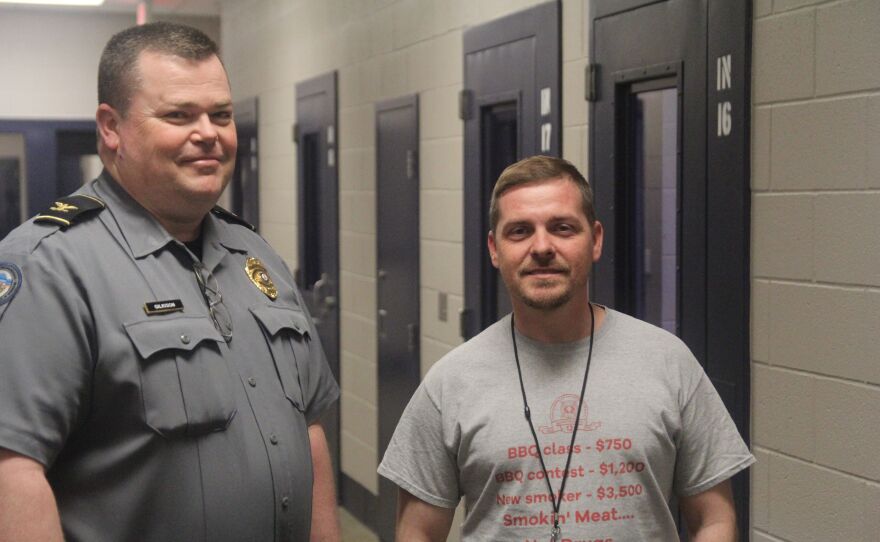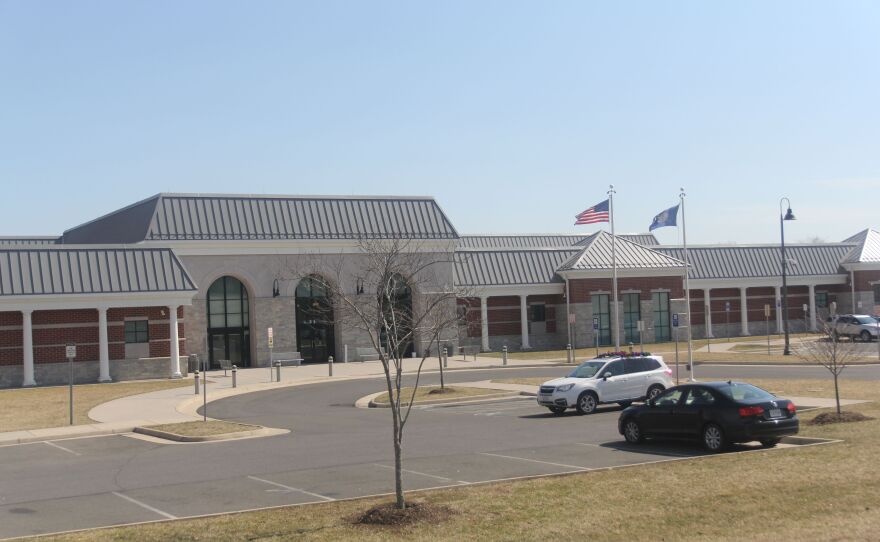According to the superintendent of the Rappahannock-Shenandoah-Warren Regional Jail, locking up people with substance use disorders simply doesn’t work. In the first in an occasional series on local jails, WMRA’s Andrew Jenner reports on RSW’s partnership with a Richmond-based recovery organization.
[Jail doors opening, footsteps in hallway]
DOMINIQUE HINTON: I’m just looking forward to getting out of here. A lot of men need this program.
In a few moments, Dominique Hinton will walk out of the RSW Regional Jail in Front Royal. He’s headed to Richmond to begin the reentry portion of the jail’s new peer-based recovery program.
HINTON: This is something I’m most definitely looking forward to, just to help me get my life back on track.
The program began last fall at RSW. It’s designed to help people whose addictions keep landing them behind bars. Superintendent Russ Gilkison guesses that 90 percent of those incarcerated here fit that description.
RUSS GILKISON: They’re either in here actively for using, or selling or they’ve committed another crime of theft or whatever to support their habit, or they’ve violated their probation from a previous incarceration.
After more than 20 years in corrections, Gilkison is ready for a new approach.
GILKISON: When we hold people in jail, we’re just warehousing people. We’ve got to find new ways to try to address the addiction disease that they have.
That’s where Christopher Renquest comes in.
CHRISTOPHER RENQUEST: I am the project director of Virginia Recovery and Reentry. It is a project that is designed to create, develop, implement and operate substance use recovery programs in a jail setting.
Renquest works for the McShin Foundation, a Richmond organization that runs a peer-based recovery program for people with substance use disorders. “Peer-based” means that most staff have been through the program themselves. Renquest, who is in active recovery, started in January 2015, while he was in jail in Hanover County.
RENQUEST: It provided the hope that I could live differently than I had been living all the years that I had been in active addiction. They came in and they made me believe that recovery was possible and attainable for somebody like me.
After release, Renquest – who had been arrested 64 times – completed the McShin Foundation’s reentry program.
RENQUEST: I never thought in a million years that not only would I not be incarcerated for the rest of my life or dead from a drug overdose, but I’d be allowed to go in and out of jails, and giving the same hope that was given to me.
GILKISON: There was a time when I probably wouldn’t have even sat across the table with a guy like Chris.
That’s Gilkison again, sitting across the table from Renquest.
GILKISON: I used to be the guy, ‘lock ‘em up, make ‘em do their time.’ That doesn’t work.
Participants in the RSW program live together in two recovery pods, one for men and one for women. They spend five hours a day in facilitated groups.
RENQUEST: They do trauma classes, they address anger, communication skills, money, budgeting.
There’s space for 60 men and 30 women in the two recovery pods. Both are nearly full. At least once a week, Renquest leads group sessions. Other facilitators come to the jail on other days.
RENQUEST: They’ve bought white boards so that I can go in and do what we call chalk talk. We have videos. We bring in guest speakers. We address every aspect that we can think of to help somebody not recidivate or relapse.
The program’s reentry component is key to that. After release, participants begin a 28-day intensive residential program in Richmond, followed by a move to a sober living home, where they can stay for a few months as they find jobs and new footing in life. Half the funding for the RSW program is a $200,000 grant from the Substance Abuse and Mental Health Services Administration. The McShin Foundation is paying the other half. John Shinholser is the group’s president and co-founder.
JOHN SHINHOLSER: Every jail and every prison in America should have this type of program. The best studies, on average, are showing a 20 percent reduction in recidivism for these type of programs. They pay for themselves. They create healthier communities. It’s almost sinful, disgraceful that this stuff ain’t happening in facilities all across America.
Gilkison is cautiously optimistic that the new program is a step in the right direction.
GILKISON: Time will tell. We’ve had five people successful so far. And I’m sure that we’re going to have people that are going to have initial successes that may relapse. Unfortunately, that’s just part of the recovery process, from what I’ve seen.
The last of several doors at RSW opens and clangs shut. Hinton and Renquest step out into bright sunshine. They head toward a waiting truck, bound for Richmond and the start of the reentry process.
HINTON: I’m going to go ahead and watch these men who are actually out here walking it. I’m going to see if I can follow them and help change my life.
[Renquest and Hinton drive off to Richmond]
Of the several hundred people per year cycle who through the McShin Foundation’s program, Shinholser said, about 40 percent remain engaged in their recovery two years later. That’s a rate they’re proud of. Still, that means there are also plenty of setbacks. Prior to this story airing, Hinton was dismissed for noncompliance and returned to RSW. Comparing substance use disorder to other chronic diseases like diabetes and hypertension, Shinholser said they expect and prepare for unsuccessful attempts at recovery – and, frequently, readmit participants when they’re ready to try again.



